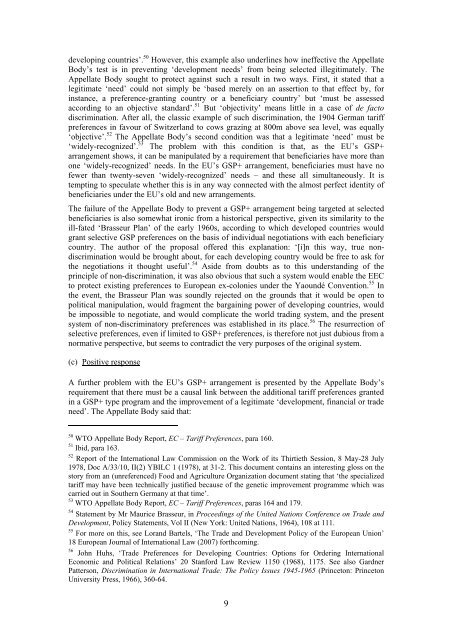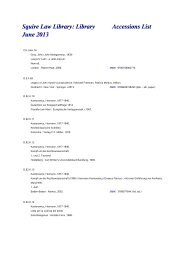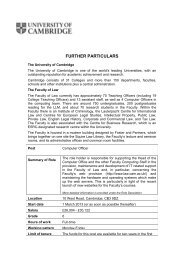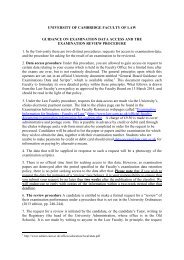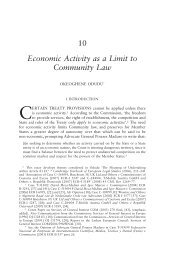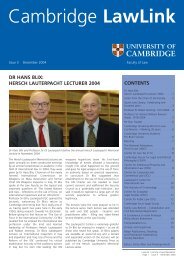The WTO legality of the EU's GSP+ arrangement Dr Lorand Bartels ...
The WTO legality of the EU's GSP+ arrangement Dr Lorand Bartels ...
The WTO legality of the EU's GSP+ arrangement Dr Lorand Bartels ...
Create successful ePaper yourself
Turn your PDF publications into a flip-book with our unique Google optimized e-Paper software.
developing countries’. 50 However, this example also underlines how ineffective <strong>the</strong> AppellateBody’s test is in preventing ‘development needs’ from being selected illegitimately. <strong>The</strong>Appellate Body sought to protect against such a result in two ways. First, it stated that alegitimate ‘need’ could not simply be ‘based merely on an assertion to that effect by, forinstance, a preference-granting country or a beneficiary country’ but ‘must be assessedaccording to an objective standard’. 51 But ‘objectivity’ means little in a case <strong>of</strong> de factodiscrimination. After all, <strong>the</strong> classic example <strong>of</strong> such discrimination, <strong>the</strong> 1904 German tariffpreferences in favour <strong>of</strong> Switzerland to cows grazing at 800m above sea level, was equally‘objective’. 52 <strong>The</strong> Appellate Body’s second condition was that a legitimate ‘need’ must be‘widely-recognized’. 53 <strong>The</strong> problem with this condition is that, as <strong>the</strong> EU’s <strong>GSP+</strong><strong>arrangement</strong> shows, it can be manipulated by a requirement that beneficiaries have more thanone ‘widely-recognized’ needs. In <strong>the</strong> EU’s <strong>GSP+</strong> <strong>arrangement</strong>, beneficiaries must have n<strong>of</strong>ewer than twenty-seven ‘widely-recognized’ needs – and <strong>the</strong>se all simultaneously. It istempting to speculate whe<strong>the</strong>r this is in any way connected with <strong>the</strong> almost perfect identity <strong>of</strong>beneficiaries under <strong>the</strong> EU’s old and new <strong>arrangement</strong>s.<strong>The</strong> failure <strong>of</strong> <strong>the</strong> Appellate Body to prevent a <strong>GSP+</strong> <strong>arrangement</strong> being targeted at selectedbeneficiaries is also somewhat ironic from a historical perspective, given its similarity to <strong>the</strong>ill-fated ‘Brasseur Plan’ <strong>of</strong> <strong>the</strong> early 1960s, according to which developed countries wouldgrant selective GSP preferences on <strong>the</strong> basis <strong>of</strong> individual negotiations with each beneficiarycountry. <strong>The</strong> author <strong>of</strong> <strong>the</strong> proposal <strong>of</strong>fered this explanation: ‘[i]n this way, true nondiscriminationwould be brought about, for each developing country would be free to ask for<strong>the</strong> negotiations it thought useful’. 54 Aside from doubts as to this understanding <strong>of</strong> <strong>the</strong>principle <strong>of</strong> non-discrimination, it was also obvious that such a system would enable <strong>the</strong> EECto protect existing preferences to European ex-colonies under <strong>the</strong> Yaoundé Convention. 55 In<strong>the</strong> event, <strong>the</strong> Brasseur Plan was soundly rejected on <strong>the</strong> grounds that it would be open topolitical manipulation, would fragment <strong>the</strong> bargaining power <strong>of</strong> developing countries, wouldbe impossible to negotiate, and would complicate <strong>the</strong> world trading system, and <strong>the</strong> presentsystem <strong>of</strong> non-discriminatory preferences was established in its place. 56 <strong>The</strong> resurrection <strong>of</strong>selective preferences, even if limited to <strong>GSP+</strong> preferences, is <strong>the</strong>refore not just dubious from anormative perspective, but seems to contradict <strong>the</strong> very purposes <strong>of</strong> <strong>the</strong> original system.(c) Positive responseA fur<strong>the</strong>r problem with <strong>the</strong> EU’s <strong>GSP+</strong> <strong>arrangement</strong> is presented by <strong>the</strong> Appellate Body’srequirement that <strong>the</strong>re must be a causal link between <strong>the</strong> additional tariff preferences grantedin a <strong>GSP+</strong> type program and <strong>the</strong> improvement <strong>of</strong> a legitimate ‘development, financial or tradeneed’. <strong>The</strong> Appellate Body said that:50 <strong>WTO</strong> Appellate Body Report, EC – Tariff Preferences, para 160.51 Ibid, para 163.52 Report <strong>of</strong> <strong>the</strong> International Law Commission on <strong>the</strong> Work <strong>of</strong> its Thirtieth Session, 8 May-28 July1978, Doc A/33/10, II(2) YBILC 1 (1978), at 31-2. This document contains an interesting gloss on <strong>the</strong>story from an (unreferenced) Food and Agriculture Organization document stating that ‘<strong>the</strong> specializedtariff may have been technically justified because <strong>of</strong> <strong>the</strong> genetic improvement programme which wascarried out in Sou<strong>the</strong>rn Germany at that time’.53 <strong>WTO</strong> Appellate Body Report, EC – Tariff Preferences, paras 164 and 179.54 Statement by Mr Maurice Brasseur, in Proceedings <strong>of</strong> <strong>the</strong> United Nations Conference on Trade andDevelopment, Policy Statements, Vol II (New York: United Nations, 1964), 108 at 111.55 For more on this, see <strong>Lorand</strong> <strong>Bartels</strong>, ‘<strong>The</strong> Trade and Development Policy <strong>of</strong> <strong>the</strong> European Union’18 European Journal <strong>of</strong> International Law (2007) forthcoming.56 John Huhs, ‘Trade Preferences for Developing Countries: Options for Ordering InternationalEconomic and Political Relations’ 20 Stanford Law Review 1150 (1968), 1175. See also GardnerPatterson, Discrimination in International Trade: <strong>The</strong> Policy Issues 1945-1965 (Princeton: PrincetonUniversity Press, 1966), 360-64.9


